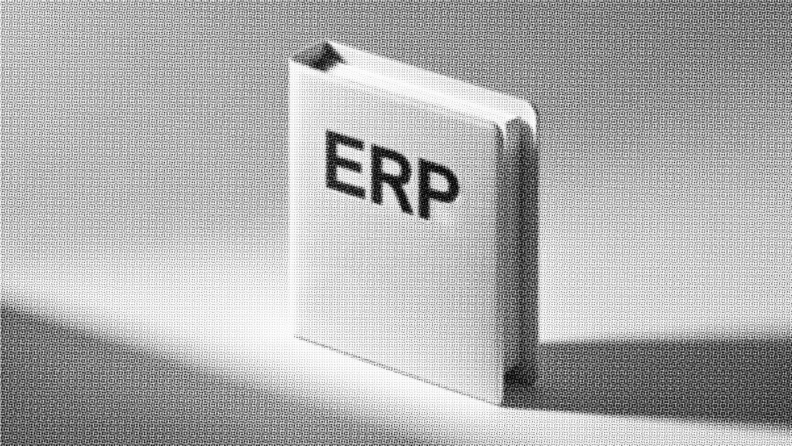ERP is the Finance Guru: Integrating ERP into your financial management ensures accurate reporting, efficient budgeting, and streamline processes, enhancing overall financial health.
No Human Error: As in other functions, ERP removes the human error from finance — guaranteeing your numbers are accurate.
Less Prep Time: Rather than worrying about crunching the numbers, your team can concentrate on making decisions using data.
Over the years, I’ve helped companies implement Enterprise Resource Planning (ERP) systems and worked with ERP in financial management — and it’s discussion-worthy.
I’ve covered what you need to know about an ERP in finance, how to choose the right ERP financial system, the ERP features you should look for, and how they help your finance function perform better.
Introduction to ERP in Financial Management
For over 60 years, ERP financial management systems have transformed the way businesses manage their financial functions.
The nature of the finance function is changing. Instead of reporting on the past, the finance function needs to look toward the future and be able to steer the organization through uncertainty and volatility. It needs to create a higher sense of order and clarity around choices.
You can’t do that if you’re spending 80 percent of your time reporting, or even worse, doing manual transactions with a high quality-control need.
Integrated ERP software solutions offer a comprehensive platform for streamlining and automating most financial processes, from accounting and budgeting to procurement and reporting.
The Best Financial ERP Systems Available
Our team has researched what’s on the market and determined that these are the best options available:
The seamless integration of various financial modules is at the heart of ERP systems, enabling your business to centralize and consolidate financial data, enhance data accuracy, reduce the risk of errors, and provide real-time visibility into financial performance.
Which features should you look for?
Key Features of ERP Financial Modules
Modern ERP systems offer a rich set of financial modules that cater to businesses's diverse needs. These modules are designed to streamline and automate your financial processes, ensuring accuracy, efficiency, and compliance.
But take if from someone who has managed accounting teams and implemented financial systems: Not every feature is essential.
Here are some of the key features you should look for.
General Ledger
One of the key features of ERP financial modules is the general ledger.
It’s the central repository for your company’s financial transactions, providing you with a comprehensive and accurate record of the organization's financial activities, for centralized financial reporting and analysis.
Accounts Receivable and Accounts Payable
The Accounts Receivable (AR) and Accounts Payable (AP) modules manage customer invoicing, payment processing, and vendor bills. These modules automate invoicing, track outstanding payments, and facilitate efficient cash flow management.
By automating these tasks, your business can reduce the risk of late payments, improve cash flow, and enhance its overall financial health.
Asset Management
A financial ERP system's asset management module should enable your business to track and manage its fixed assets, including depreciation, maintenance, and disposal. This helps optimize your company’s asset utilization and ensure regulatory compliance.
Profit Tracking and Analysis
Effective profit tracking and profit analysis are crucial for financial management, and ERP systems provide powerful tools to support these functions and gain better visibility into your company's financial performance.
Risk Management
Effective risk management is essential for financial stability, and ERP systems offer robust features to help your company manage various financial risks.
Integrated risk monitoring — such as currency fluctuations, credit exposures, and liquidity concerns — is vital for real-time financial risk management, as it allows you to identify and address potential issues before they escalate.
Reporting and Analytics
Comprehensive financial reporting and analytics tools help you gain valuable insights into your company’s financial performance at any point in time.
The ERP system should provide customizable, role-based dashboards, real-time financial reporting and statements, and advanced analytics to support informed decision-making.
Multi-Currency and Tax Management
If your business operates across multiple currencies and tax jurisdictions, you’ll need an ERP system that provides robust multi-currency management and tax management features.
These features can simplify complex financial calculations and operations, ensure compliance in each jurisdiction, enable effective currency risk management, reduce the risk of errors and their associated penalties, and provide a unified view of your organization's financial performance.
Dashboards
ERP systems have customizable dashboards that integrate financial data from various sources, providing real-time insights into your company’s financial performance. This allows you to monitor key performance indicators (KPIs) at a glance, quickly identifying areas that require attention.
Automated Controls and Auditing
ERP systems often include built-in controls and audit trails that help mitigate the risk of fraud, errors, and unauthorized access to financial data. These features should include role-based access permissions, automated approval workflows, and comprehensive audit logs.
Budgeting and Forecasting
Advanced budgeting and forecasting capabilities allow your business to create detailed financial plans, track spending, and generate accurate projections. This functionality supports strategic decision-making and helps you anticipate and respond to market changes.
ERP systems should also enable advanced scenario planning and forecasting capabilities to allow you to model different financial situations and assess their potential impact on your organization. This helps you develop contingency plans and make informed decisions to manage financial risks.
Integration and Connectivity
The ERP system you choose should seamlessly integrate with your other business functions, such as supply chain management, human resources, and customer relationship management. Make sure it connects with your existing tech stack, especially if you're using a separate financial management software and other core tools.
This integration provides a holistic view of your operations and facilitates data-driven decision-making.
5 Benefits of ERP in Financial Management
These five benefits are well worth the investment. Let’s take a close look at each.
1. Improved Efficiency and Productivity
ERP systems free up your finance team's time and resources. Integrating various financial functions also allows an ERP system to streamline workflows and automate repetitive, manual, time-consuming tasks. This reduces data entry errors and improves the quality of work, leading to greater efficiency and enhanced productivity.
This increased productivity allows your finance and accounting team to focus on more strategic and value-added activities, such as financial analysis, forecasting, and decision-making.
2. Financial Transparency
ERP systems play a crucial role in improving financial transparency within your business — something every business owner and CFO wants and needs. Customizable dashboards and reporting tools provide a clear and comprehensive picture of your financial health.
In addition to having real-time data access to comprehensive financial data and reporting, you gain these aligned benefits:
- Improved visibility: With a centralized view of your company’s financial performance, you can monitor key metrics, identify trends, and make informed decisions.
- Enhanced compliance: ERP systems often include features that help your business meet financial regulatory compliance and reporting requirements, including automated tax calculations, audit trails, and the ability to generate regulatory reports easily.
- Increased accountability: Having an audit trail for all financial transactions improves accountability and transparency, helping your company mitigate the risk of fraud, errors, and unauthorized access to financial data.
3. Enhanced Planning and Budgeting
ERP systems offer advanced features that can significantly improve your company’s financial planning, budgeting, and forecasting processes. Benefits include:
- Integrated budgeting: ERP systems allow you to create, monitor, and adjust budgets in real-time, ensuring alignment with your company’s financial goals and objectives.
- Scenario planning: Often, ERP systems include scenario planning and simulation capabilities, allowing you to model different financial situations and assess their potential impact on your organization. This helps you develop contingency plans and make informed decisions to manage financial risks.
- Improved forecasting: You can generate more accurate and reliable financial forecasts by leveraging historical data and real-time financial information. This enhances your ability to anticipate and respond to changing market conditions, ensuring financial stability and growth.
4. Minimized Human Error
Another benefit of implementing an ERP system in financial management is eliminating (or, at least, greatly reducing) human errors, which leads to greater accuracy and confidence in results. How does a financial ERP do this?
- Automated data entry: ERP systems automate data entry, reducing the likelihood of manual errors and improving the overall quality of financial information.
- Validation and reconciliation: ERP systems incorporate built-in validation and reconciliation processes like automated account reconciliations, error detection, and data validation to ensure the consistency and accuracy of financial data.
- Standardized processes: ERP systems promote the use of standardized financial processes and workflows that help eliminate inconsistencies, reduce the risk of errors, and ensure that financial tasks are performed consistently and efficiently.
- Audit trails: Comprehensive audit trails provide a clear record of all activities and changes, helping you identify the source of any errors or discrepancies, facilitating timely corrections, and reducing the impact of human errors.
5. Centralized Financial Information
Another huge benefit is the centralization of financial information. By integrating various financial functions and data sources, you get a single, comprehensive repository for all financial data.
ERP systems thus facilitate cross-functional collaboration by providing a shared financial data and processes platform that enables your finance team to work more closely with other departments, such as sales, procurement, and operations, enhancing overall organizational efficiency.
Real-World Applications and Case Studies
To illustrate ERP's real-world applications and impact on financial management, I wanted to explore three case studies, showcasing successful ERP implementations across different industries.
Case Study 1: Manufacturing
Challenges: A leading manufacturing company faced challenges in managing its financial operations, including:
- Disparate systems
- Manual data entry
- Inconsistent reporting.
Results: After implementing a comprehensive financial ERP solution (specific to manufacturing), the manufacturing company was able to achieve the following:
- 20% reduction in accounting errors
- 15% improvement in on-time payments
- 30% increase in the efficiency of financial reporting and analysis
Case Study 2: Retail
Challenges: A large retail organization struggled with:
- Fragmented financial systems
- Limited visibility into its financial operations across multiple locations
Results: By implementing an ERP solution (specific to apparel), the retail company achieved the following:
- 12% reduction in overall financial processing costs
- 25% improvement in invoice processing efficiency
- 18% increase in on-time supplier payments.
Case Study 3: Professional Services
Challenges: A leading professional services firm faced challenges in managing complex financial operations, including time-consuming manual processes, disparate data sources, and limited financial visibility.
Results: By implementing an ERP solution, the PS firm achieved the following:
- 15% increase in billable hours
- 12% improvement in project profitability
Choosing the Right ERP Financial System
The ERP system you choose for your business is a critical decision that can significantly impact overall business performance. When choosing your system, make sure you consider:
1. Business Needs and Goals
ERPs aren’t one-size-fits-all.
An ERP system's financial modules must meet your company's and industry-specific needs and strategic objectives. The system should provide comprehensive financial management capabilities, including general ledger, accounts receivable, accounts payable, and budgeting. The RFP process will help you sort this out.
2. Ease of Use
Ease of use and user-friendly interfaces are also essential when choosing an ERP financial system. The system should be intuitive and accessible to users across your business, reducing the learning curve and promoting widespread adoption.
The system should also offer customizable dashboards, reporting tools, and analytics capabilities to provide valuable insights and support informed financial decision-making.
3. Vendor Reputation
Your business should consider an ERP vendor's reputation, implementation support, and ongoing maintenance and updates.
With all the undeniable benefits of ERP in financial management, it comes down to finding the right ERP solution; aka sending out RFPs and carefully evaluating vendor responses and ERP features that will help your finance functions perform better.
You're one step closer to getting your ERP system up and running.
Subscribe For More ERP Financial Management Insights
Ready to compound your abilities as a finance professional? Subscribe to our free newsletter for expert advice, guides, and insights from finance leaders shaping the tech industry.



